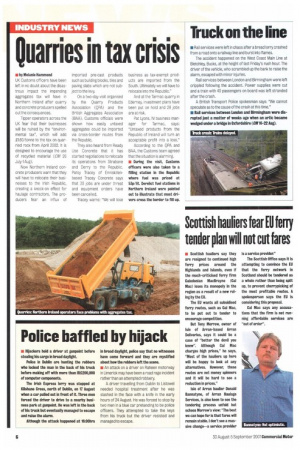Quarries in tax crisis
Page 6

If you've noticed an error in this article please click here to report it so we can fix it.
• by Melanie Hammond UK Customs officers have been left in no doubt about the disastrous impact the impending aggregates tax will have in Northern Ireland after quarry and concrete producers spelled out the consequences.
Tipper operators across the UK fear that their businesses will be ruined by the "environmental tax", which will add .21.60/tonne to the tax on quarried rock from April 2002. It is designed to encourage the use of recycled material (CM 26 July-1 Aug).
Now Northern Ireland concrete producers warn that they will have to relocate their businesses to the Irish Republic, creating a knock-on effect for haulage contractors. The producers fear an influx of imported pre-cast products such as building blocks, tiles and paving slabs which are not subject to the Levy.
On a two-day visit organised by the Quarry Products Association (QPA) and the British Aggregates Association (BAA), Customs officials were shown how easily untaxed aggregates could be imported via cross-border routes from the Republic.
They also heard from Ready Use Concrete that it has started negotiations to relocate its operations from Strabane and Deny to the Republic. Patsy Tracey of Enniskillenbased Tracey Concrete says that 30 jobs are under threat and equipment orders have been cancelled.
Tracey warns: "We will lose business as tax-exempt products are imported from the South. Ultimately we will have to relocate into the Republic."
And at the Tarmac quarry in Ederney, investment plans have been put on hold and 28 jobs are at risk.
Pat Lyons, NI business manager for Tarmac, says: "Untaxed products from the Republic of Ireland will turn an acceptable profit into a loss."
According to the QPA and BAA, the Customs team agreed that the situation is alarming.
• During the visit, Customs officers were also taken to a filling station in the Republic where fuel was priced at 53p/lit. Derelict fuel stations in Northern Ireland were pointed out to illustrate that most drivers cross the border to fill up.




















































































































